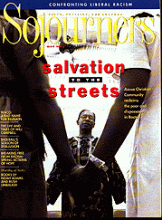I went to my favorite blues club two days before Christmas -- a night I expected would be slow. And there was Archie Edwards, strumming an acoustic guitar and singing solo, slouched in a chair behind a microphone on an otherwise empty stage, and telling stories of his early days in Mississippi. It was not the stuff of big nights at Tornado Alley.
It definitely was the blues, however. And blues, along with traditional folk, is what makes up the best of Bob Dylan's relatively obscure Good As I Been to You recording and Eric Clapton's enormously successful Unplugged release. Acoustic recordings from two well-known electric guitarists are something of a surprise; I think we can assume that these "aging rockers" are offering a tip of the hat to their roots.
The format of Bob Dylan's new release is not too different from Archie Edwards' regular appearances at Tornado Alley. It's just Bob on this one -- one guitar, one harp, one voice. If you don't like Dylan in any of these categories, perhaps you should leave this 30th-anniversary release -- his 38th recording -- for the Dylan collectors to snatch up.
Though completely acoustic, Good is reminiscent of Dylan's 1974 release Blood on the Tracks -- especially the tenderness conveyed in "Hard Times" -- "Many days you have lingered all around my cabin door/oh, hard times, come again no more." Compared to Another Side of Bob Dylan (1964), for example, his guitar work is much more intricate and accomplished now. Dylan continues telling stories as he always has, with six titles of the 13 songs on Good carrying characters' names. And he appears not to have lost the twinkle in his eye as he renders the old favorite "Froggie Went a Courtin'."
Read the Full Article

